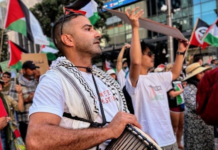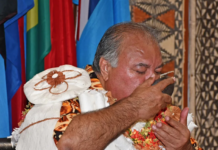Political Roundup: A different sort of Anzac Day
by Dr Bryce Edwards

It’s a very different Anzac Day this year. In recent years this remembrance day has been steadily transforming. Most notably, becoming more popular, with attendance at ceremonies up, and an apparently more interested population in general. Last year’s centenary also bolstered the importance of the day. But this year, due to the Christchurch terrorist attacks, it’s all changed again.
For the single best examination of how Anzac Day is transforming, it’s worth reading the Christchurch Press editorial, which explains some of the changes and calls for even more modernisation, to turn the day into a more liberal-progressive way of dealing with war and its victims – see: Anzac Day will never be the same.
The editorial explains that the form Anzac Day takes is always going to be a product of the politics of the time. And so, what has happened in Christchurch, and what’s occurring around the world – and in the Middle East, in particular – means that Anzac Day is changing. Essentially, it’s becoming more political, and New Zealand society is using the day to reflect on global conflict.
It concludes with the hope that those attending remembrance ceremonies today might think of victims of conflicts beyond the traditionally recognised ones: “it would be nice to imagine that they will be thinking about more than the thousands of Australians and New Zealanders who died over a century ago. Instead, they might also turn their minds to the many who have been killed in the decades since, sometimes very recently and very close to home.”
The growth and modernisation of Anzac Day is such that according to John Tamihere it has become more nationally important to New Zealanders than Waitangi Day – see: Of all our days Anzac Day is our real national day.
Tamihere sees the day as one of both diversity and unification: “The beauty about our Anzac Day is the way in which, regardless of the conflict, we can all stand together and own the memory of whānau who gave their lives selflessly in order to defend who and what we are today. It matters not if some stand there to remember ancestors who gave their lives in the New Zealand Land Wars, the Boer War, World War I or World War II, or indeed even newcomers to New Zealand — now New Zealand citizens — whose ancestors gave their lives for their lands fighting on opposite sides. The beauty about Anzac Day is it allows us to embrace as a nation all of these hurts and sufferings.”
However there seems to be a heightened awareness this year that war commemorations can sometimes spill into patriotism and nationalism, which is a bitter irony, given that the invasion of Gallipoli and World War I strongly represents the folly of such emotions and ideologies.
This point is well made by Glenn McConnell today in a column in which he says Gallipoli should be “a reminder governments can so easily disregard human lives” utilising their “propaganda machine” to foster nationalism and falsehoods – see: Anzac Day should be a time of reflection, not celebration or patriotism.
McConnell reflects on last year’s centenary, saying “As we commemorated a century since the war, many people conflated our coming together at ceremonies with national pride and cohesion.” The major problem, he argues, is that although we are commemorating the tragic invasion of a Muslim land, today the “one group that is not readily welcomed into this collective commemoration is the Muslim community.”
He’s referring in particular to the decision of RSAs not to include Muslim prayers in their services today. Here’s his wider point about this: “When our leaders stand at memorials to preach about our unity, remember that they are not giving us the full picture. We are not ‘one’. We are not yet united. People repeat those comforting myths to lull themselves into a false security. The ‘one’ which they speak of is a Pākehā assimilated ‘one’. It is one Christian god. It is the one group which wells up with national pride on Anzac Day. New Zealand, we have a lot to be proud of. But we shouldn’t be proud of everything We shouldn’t be proud that we’ve let a great opportunity to unite slip. We shouldn’t be proud that for more than a century and counting, we treat our Muslim friends more like enemies.”
Similarly, a Press editorial today disagrees with the exclusion of Muslim prayers: “The obvious subtext, that Anzac Day commemorations are only about Anzacs, and are somehow Christian, is interesting and flawed” – see: Commemorating Anzac Day in a ‘different’ country. Instead of exacerbating division, what the remembrance of war “should turn our minds to, even as we commemorate those of our number who made the ultimate sacrifice, is reconciliation and peace.”
Today’s Otago Daily Times editorial also carries this message of inclusion and tolerance, saying we need to be “employing kindness, respect and tolerance in the present” when dealing with past wars, and that Anzac Day “is not a day of exclusivity, intolerance or rigidity. That is not what this country stands for and is not what it has fought for” – see: Honouring our past, present and future.
In terms of the decision not to include Muslim prayers in the ceremonies, the paper reflects on New Zealand’s relationship with Islam and Turkey: “But Islam has never been the enemy of New Zealand. We have always strived to be an open and tolerant country. We have had Muslim members of our armed forces and we have fought alongside Muslim soldiers from other nations. We celebrate Anzac Day on the date our own soldiers stormed the beaches of Turkey, attacking and killing Turkish soldiers – many of them Muslim. No Muslim army has stormed our own shores. Nor does Turkey forbid us from remembering our fallen in their own country, year after year. Germans, Italians, Japanese and others we have fought also deserve our respect and empathy. We can honour our own soldiers while also empathising with the suffering experienced by our then-enemies.”
Of course, as with all “national days” there’s a strong element of “state building” and mythology. According to James Robins, at this time each year, “folklore and tradition overtake fact, and much of the nation seems to embrace a soft-lit consensus, or worse, outright delusion. The repetition of half-truths, misremembered legends, and popular fictions is elevated to high art”. He believes that the so-called “Special Relationship” between New Zealand, Australia and Turkey is rather overplayed – see: The repetition of Anzac half-truths.
The biggest falsehood of Anzac Day, according to Robins, is the whitewashing of the genocide that occurred at the same time as the invasion of Gallipoli, which was intrinsically linked – see his article in the Guardian: Anzacs witnessed the Armenian genocide – that shouldn’t be forgotten in our mythologising.
And back in New Zealand, the narrative around Anzac Day is strongly reinforced by two Peter Jackson-associated exhibitions in Wellington – Te Papa’s “Gallipoli: The Scale of Our War” and the old Dominion Museum’s “The Great War Exhibition”. But both of these are strongly critiqued by Massey University’s Nicholas Haig, who says they “nourish nationalistic and chauvinistic sentiment” – see: War remembrance: Acting out or working through?
On a lighter note, for another history lesson on how New Zealand has come to commemorate Anzac Day, see Bob Edlin’s Anzac Day – how local body leaders initiated a half-day holiday in NZ. In this, he looks back at what led to the national half-day holiday, noting “We have been checking the files and find a story akin to rival trans-Tasman claims about Phar Lap and pavlova cake.”
Controversy over cancellations and security
The various cancellations and increased security this year has also made today rather strange, with a lot of debate about whether authorities are doing the right thing. In Auckland, two-thirds of Anzac Day services were cancelled, and one was cancelled in Christchurch.
The New Zealand Herald is very unconvinced about the need for the cancellations, saying “Unless they know of a threat to Anzac Day, the police should let New Zealand honour its fallen as usual without fear” – see the editorial, Anzac Day is no time to give in to terror.
The newspaper argues that “Terrorism succeeds when a community is afraid to go about its normal life”, and “it becomes hard to deny the shooter in Christchurch has achieved a part of his destructive purpose. The police ought not to be giving him this satisfaction without good reason.”
This is also the view of John Tamihere: “Anzac Day celebrations are about honouring those lost in conflict and NOT the pointless ugly acts conducted in Christchurch. We cannot surrender what we are, who we are or where we are after this alleged lone ranger attack, or any other single act. But it feels to me, somewhere, someone has surrendered our identity as Kiwis.”
Former politician and soldier, Heather Roy also says she’s offended by the cancellations, saying they are a blow to the freedom that New Zealand soldiers have died for: “Thanks to their sacrifices we live in a free society. We’re free to go where we please, free to gather with others, enjoy freedom of speech and freedom of association. Yet this ANZAC Day the Police have told us we’re not free to gather with our local communities because they can’t protect us. They blame the government imposed heightened security threat” – see: Resist Anzac Day Restrictions. Attend and March.
They’re not the only ones dissatisfied. 1News reports that the backlash has been strong against the cancellations, with RSA leaders being blamed – see: RSA president called ‘coward’ and ‘disgrace’ following Anzac cancellations in Auckland.
There’s some dispute, however, over who actually made the cancellation decisions, with Police Minister Stuart Nash stating clearly that it was an RSA decision, causing some RSA officials to push back strongly. One official went on record to explain what he was told by Police: “The first thing we were told was you will have no parades and no marches anywhere, and after a bit of discussion on that we were then told you will have one civic parade and you will have one dawn parade… No arguments… it was an order, we were directed, it wasn’t would you please, it was you will have” – see Kim Baker Wilson’s RSA and police in standoff over who is responsible for cancelled Anzac Day events.
But for the best discussion of security arrangements for today, see the Herald’s Kiwi troops not designed for Anzac Day crowd control, police say they have the resources.
Finally, although the dawn services are already over today, there’s plenty of memorial coverage, war films and documentaries to watch on TV – see Fiona Rae’s What to watch on TV this Anzac Day. And if you want to make a stand for peace, there are also lots of anti-war events around the country – see: Anzac Day peace vigils and picnics.








